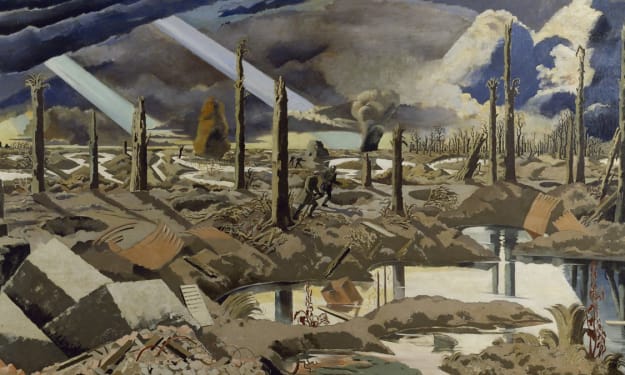Homeric Heroism
And What It Says About the Meaning of Life

To what extent did Homer view Odysseus as a heroic figure?
Throughout the Odyssey, Homer emphasises Odysseus’s heroism whilst subtlety insisting on his self-sabotage. Odysseus’ heroism is shown by his being King of Ithaca and leader of his crew, alongside his divine status as champion of the gods, in his case Athene; echoing more ancient heroes like Hercules and Perseus. Yet if it was indeed Homer’s intention to present Odysseus as a hero, he is presented most peculiarly. To begin with, there is the problem of his lack of personal vigour. Unlike Achilles or Hercules, whose heroism stems from his outstanding abilities in battle, Odysseus’ heroism is based on stratagems, as seen on every occasion including his defeats. From Troy to Polyphemus’ Cave and to Ithaca, Odysseus wins by undermining the position of his enemies rather than a personal heroic confrontation, showing thus his great intelligence and cunning. Whilst at the same time alarming us with his slyness and his apparent willingness to sacrifice his men. Homer gives us many examples of Odysseus’ wiles on many occasions, such as in Book IX with the Ci-cones and in Book XII with Scylla and Charybdis. In the same way a Spartan would conceive of a bow and arrow as unmanly (which of course were the very symbolic instruments which Odysseus used to prove his worth), Odysseus’ cunning and his wit, so unique to him, is both the foundation and the main undermining quality of his heroism.
The major obstacles to Odysseus being a traditional hero are as follows; Odysseus was a terrible leader of men as evidenced by the fact that all his crew perished at the end. Odysseus bears the responsibility for this disaster in several ways; mainly, that it was his curiosity of other lands and peoples which caused him to explore or conquer against the will of his crew. His occasional impertinence—such as when he demands gifts and takes food from Polyphemus—offends the laws of Xenia, causing the death of his men on those occasions, most disastrously seen in his facing the Laestrygonians where all but his ship survived in Book X. And to expand further upon the first statement of Odysseus’ self-sabotage, it was ultimately Odysseus’ own hubris which compelled him to shout his name as he was making his escape from Polyphemus, arguably thus sealing the fate of his crew and himself. Therefore upon such accusations we may find him unworthy of being a hero. However, in trying to blame Odysseus for his leadership (and thereby undermining his heroism) we are presented with one of the greatest dilemmas in the epic: fate. Did Odysseus’s faults merely facilitate his curse from allowing his men to desecrate Athene’s temple in Troy? Or did he still have power over his fate, however cursed it may have been? Moreover, if Odysseus was fated to return home alone on a foreign ship by the Cyclops’ curse, could he have still altered it after having been warned by Tiresias, or was his crew then already fated to facilitate the curse? Yet if he was indeed bound to his fate, why then did Tiresias bother warning him, indeed why did Homer think it important to tell the reader that Odysseus has been warned about the sun god’s cattle if not to make us question his responsibility in the tragedy?
Another apparently unheroic quality of Odysseus can be seen in his weakness; his periodic weeping (that is, after all, how we meet him in the first place) and his constantly seeking help from women. We see how it was that Odysseus was sent to the seas by Calypso after enjoying her hospitality for seven years, and how pathetically he was saved by Ino with advice he was arrogant enough to reject in the first place. We see how he was reduced to naked flattery as he stood before Nausicaa, who allowed him to follow her but only at a distance, and to beg the Queen which he did by clinging to her ankles like a dog in Book VII. Could a man who is willing to debase himself to such extent really be seen as heroic? Moreover, arguments have been made over whether women are the major source of woe for Odysseus, whilst others argue women to be his major source of relief. Whilst both arguments stand, they join to show that women were hugely influential towards Odysseus, thus raising again a question, would a man who is so easily swayed by woman be deemed heroic in the misogynistic world of Athenian society? Indeed if one is to take the popular definition of a hero as a bullish man of outstanding will and strength, (which often includes with it a certain mindlessness as seen in the blind rage of Achilles), Odysseus was nothing of the sort; yet this did not stop the Athenians from reciting his tale by heart for centuries to come. Although he may have been less of a warrior than Achilles in this respect, he was certainly bullish in his own way, and that was one of his most heroic qualities. His resilience in the face of adversity, as seen by his gripping onto rocks in Book V until his skin was torn from his hands, is remarkably heroic. Wept he may have done, and on occasions even contemplated suicide; yet he never gave up, neither for the sake of his glory (Kleos) nor for his family (Nostos).
In some sense, this is the moral of Homer’s Odyssey, that to be heroic was to be resilient. And yet equally important was one’s patriotism, and a man’s love for his family. In the Odyssey, what made a character an antagonist was not only whether they brought harm to Odysseus and his men, but whether or not they were an hindrance to his returning home, best symbolised by the Lotus flowers which intoxicated Odysseus’ men into idleness and forgetting their home in Book IX. Odysseus also meets greater temptations to forget Ithaca in the form of Circe and Calypso. In Calypso’s case, he was even offered immortality if he married the goddess, whilst Circe (as seen through Victorian paintings), remains to this day an allegory of lust and seduction, the sorceress turning man into beast. Arguably it is Odysseus’s patriotic love and sense of duty for his "high roof" and his beloved Penelope which makes him heroic in the eyes of Homer; a love which is proven through his twenty years of wandering, reaching its climax through his murder of all the suitors. Whilst the Battle of the Hall shows the heroism of Odysseus through its sheer savagery, and changes him from beggar and outcast to a King of Man, high judge and executioner.
In Book XI, Homer shows us the dead, and through their mouths, further argues his view on heroism. Though he may not be as great as the heroes of the past, Odysseus alone has entered the underworld without divine blood and walked out alive and succeeding in his goal, a deed that impressed even Achilles, who demanded as he saw Odysseus, "How did you dare to come below?" Odysseus could, therefore, be considered a hero above them all. Indeed, Homer makes sure to depict clearly, the pathetic nature of the dead heroes whom he meets, who in the land of the living were still celebrated so; as best summarised by Achilles, these great heroes would rather be
"a slave to some poor hind that toils for bread,
than reign the sceptred monarch of the dead."
The point therefore is clear. Homer gives us a roll call of bygone heroes to show the vanity of their heroism, which Odysseus himself had prayed for on occasions: that he would have rather perished gloriously in battle, than die afar and forgotten in desolate lands. Though never explicitly, Homer disputes the value of a hero’s Kleos throughout the Epic. In their "heroic" search for glory, none of the heroes but Hercules succeeded in triumphing over death to "dine with the divine," yet even with him, his wraith still lingers in "these joyless lands." One could even stretch the argument to say that those lands were "joyless" since they were far away from the homes of the dead in their lifetime. Therefore the greatest punishment to man is to be set far away from his home country and his people. Another example of this is Agamemnon, whom, whilst living, led the Greeks in Troy as their King, and died in the most humiliating way by being made a cuckold and stabbed by his wife in his bath. Agamemnon, who fought so hard for glory, dies in a most unheroic manner, whilst Odysseus (as prophesied by Tiresias) lives to die peacefully in bed. Neither does their opposing nature end here; on the one hand, Odysseus leaves Penelope with Telemachus who later aids him in killing the suitors; whilst Agamemnon leaves Clytemnestra by secretly sacrificing Iphigenia, a death Clytemnestra would in turn avenge by killing Agamemnon. Penelope’s loyalty to and love for Odysseus is also opposed to Clytemnestra’s infidelity and hate towards Agamemnon; and it was indeed Agamemnon who warns Odysseus not to trust woman, and to "make a secret approach" as he is returning to Ithaca. This advice Odysseus follows faithfully, and though one may argue that is demonstrating his sly and mistrustful nature which Penelope mirrors, it also shows the intelligence and resourcefulness which made him a hero worth Athene’s championship in the first place.
Book XI is also crucial in our understanding of Odysseus’ heroism in the eyes of Homer, this time in the form of Tiresias. In contrast to the rest of the dead, Tiresias (who arguably could be seen as a self-portrait of the blind bard himself) retained wisdom as a gift from Athene for his being a wise prophet in life. Tiresias famously advised Odysseus to leave Ithaca at once after killing the suitors, and to wander the land with a well-cut oar, until he reaches men so far away from the sea that salt and ships would be "quite beyond their experience," in other words, people that are not troubled by sailing and conquest and are far away from civilisation and the wrath of Poseidon. Some have used Odysseus’s immediate departure from Ithaca to undermine his Nostos, yet his leaving was an order from the prophet as his only way of appeasing Poseidon through the offering he was to make, so he may finally return home thereafter—after which, Tiresias promised him he would be able to finally die a "peaceful death" amongst "prosperous people." Prof. Goldhill argues that this showed another side of Odysseus’ heroism, his being an outcast, thus forced to roam the lands. This in turn is a trait shared by many heroes. As Hercules was forced to wander away to perform his labours, and Achilles’ rage made him constantly wander and fight alone, so too was Odysseus forced to wander alone after the death of his conspiring crew, arguably alone even amongst his men, and to travel alone hence after his rather chilling massacre. In Prof. Goldhill’s argument, an Homeric hero was a person so individual and unique that he is bound to be an outcast (which in the words of Burkhardt, an outcast is either wearied by his exile or improved by such an experience), and perhaps it is in being an outcast from civilisation itself that such persons becomes closer and more favoured by the Gods—as well as literally "larger than life." As for his having to leave for lands as far from the shore as possible, a straightforward reasoning would suggest that Odysseus must be as far away from Poseidon’s dominion as possible, since he is his most powerful enemy; whilst a deeper reading could be that he must rebuke civilisation itself, thus fulfilling Prof. Goldhill’s argument of hero as outcast.
As one reads the Odyssey, one follows Odysseus as he experiences all walks of life, from the most barbarous of peoples and lands in the form of the Laestrygonians, to the most civilised and perfect in the form of the land of Phaeacians; from the land of the dead to the eternal paradises of Ogygia and the palace of Alcinous. We understand Odysseus’ weariness at the end of his travels, at the end of which, the only important thing remaining was the fact that he has returned to a loyal wife and a loyal heir. Perhaps Homer’s banishment of Odysseus was to illustrate his weariness in the most blatant terms by his turning his back on the whole tradition of heroism and civilisation. It must also be noted that throughout the Odyssey, we only understand Odysseus’s internal feelings through his occasional sighing and lamenting, for one we know nothing of Odysseus’ reflections after his encounter with the dead. This in turn invites us to imagine ourselves as Odysseus and put ourselves in his shoes, thus coming to our own conclusions and reflections. Homer fashions his Odysseus to be like none other before him. The Odyssey itself is an allegory in which, through Odysseus, man could reflect upon the human condition; the power of fate, the role of luck, and—ultimately—the point of living. The question of "what makes Odysseus a hero?" invites another: "what makes a a worthy life?" Whereas previously, to be a hero was to fight one’s way for glory after death, Odysseus, through his intelligence, dismisses such vanity and opens up the question. It would also seem that Homer implies a subtle argument against heroism itself, for since all men must die and be cast into the underworld, does it not therefore make living more valuable than the praise one gets after one’s death? Odysseus is a conventional hero in that he is a sailor and adventurer, king of men and champion of gods; qualities which were highly prized in the world of Classical Athenians, when colonial expansionism was at its ripest, yet Odysseus was more than that. Odysseus showed, in his meeting of the dead, the vanity of conquest and glory, proving that wit is better than might, and why Odysseus was indeed worthy to be championed by Athene, and survives to a peaceful death whilst others die horrible violently. Odysseus at the end of his Odysseybecame a sage and made peace with living. By doing so he performs the most heroic deed that a living man can make: to triumph over death, or at least, over the fear and struggle of it. Homer depicts Odysseus to be to the ancient world what Christ was to be to Christians. And for this reason: as to Homer, the Ancient Athenian, and to the modern humanist, Odysseus remains well and firmly, an heroic hero.






Comments
There are no comments for this story
Be the first to respond and start the conversation.